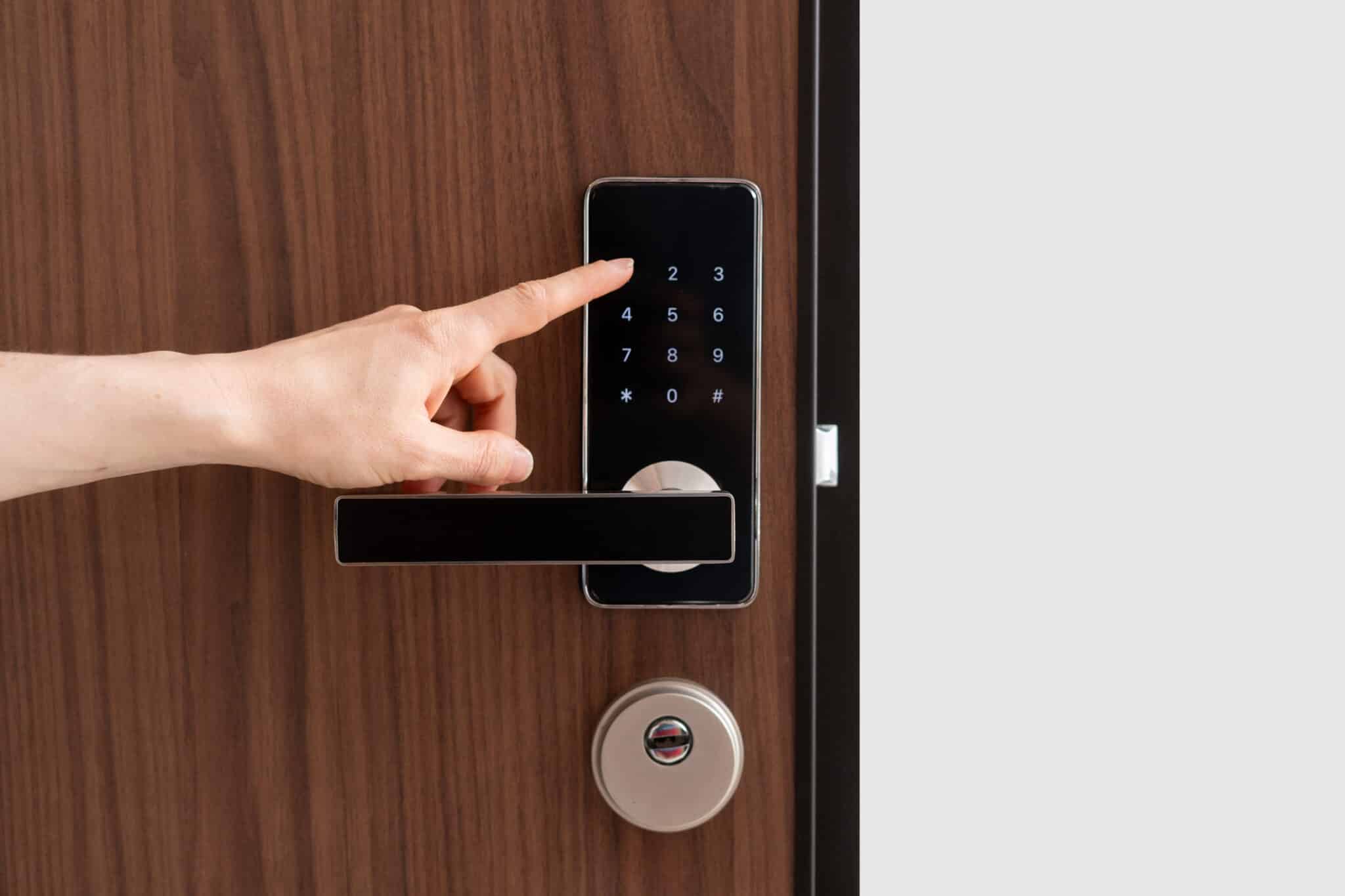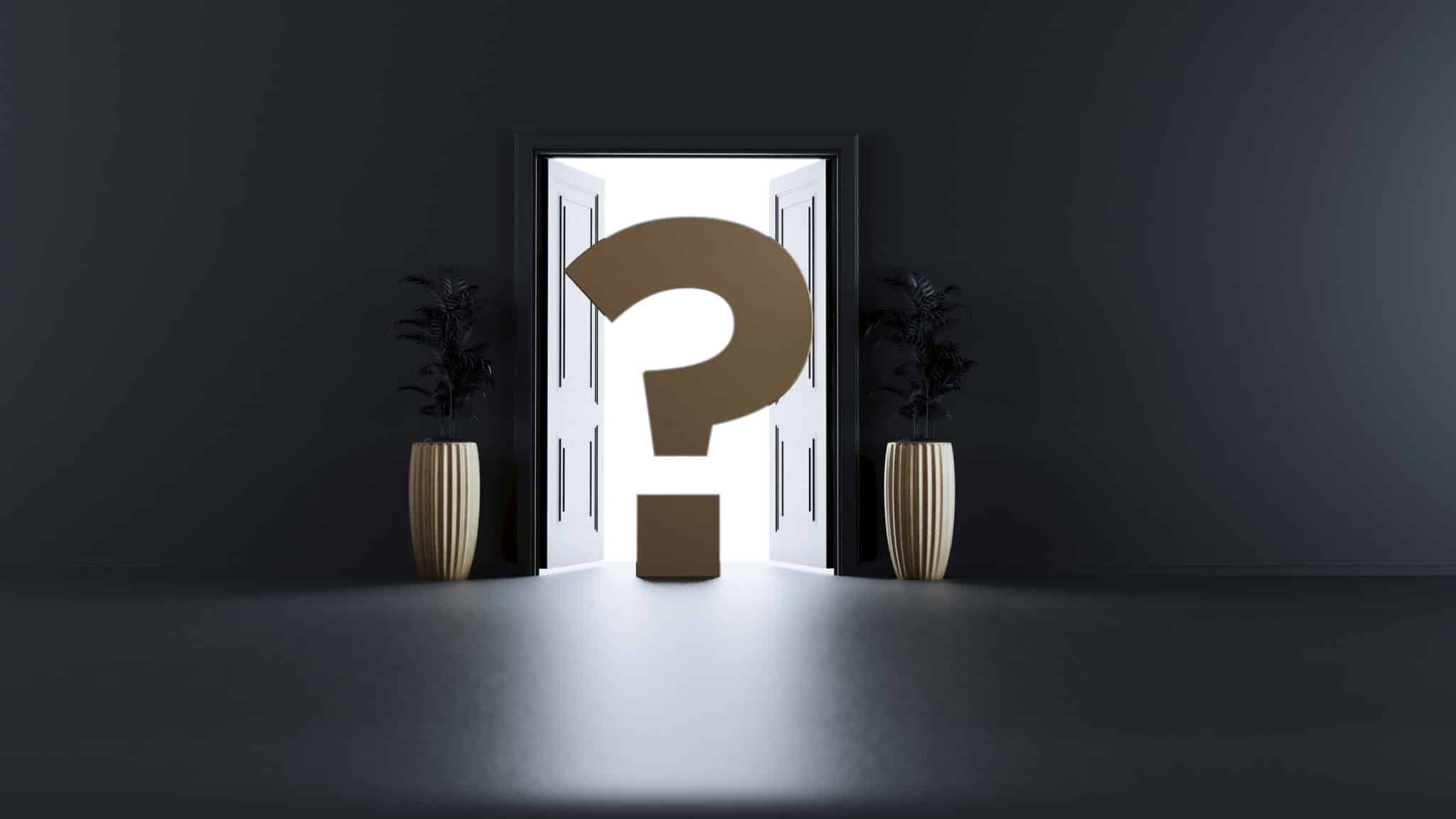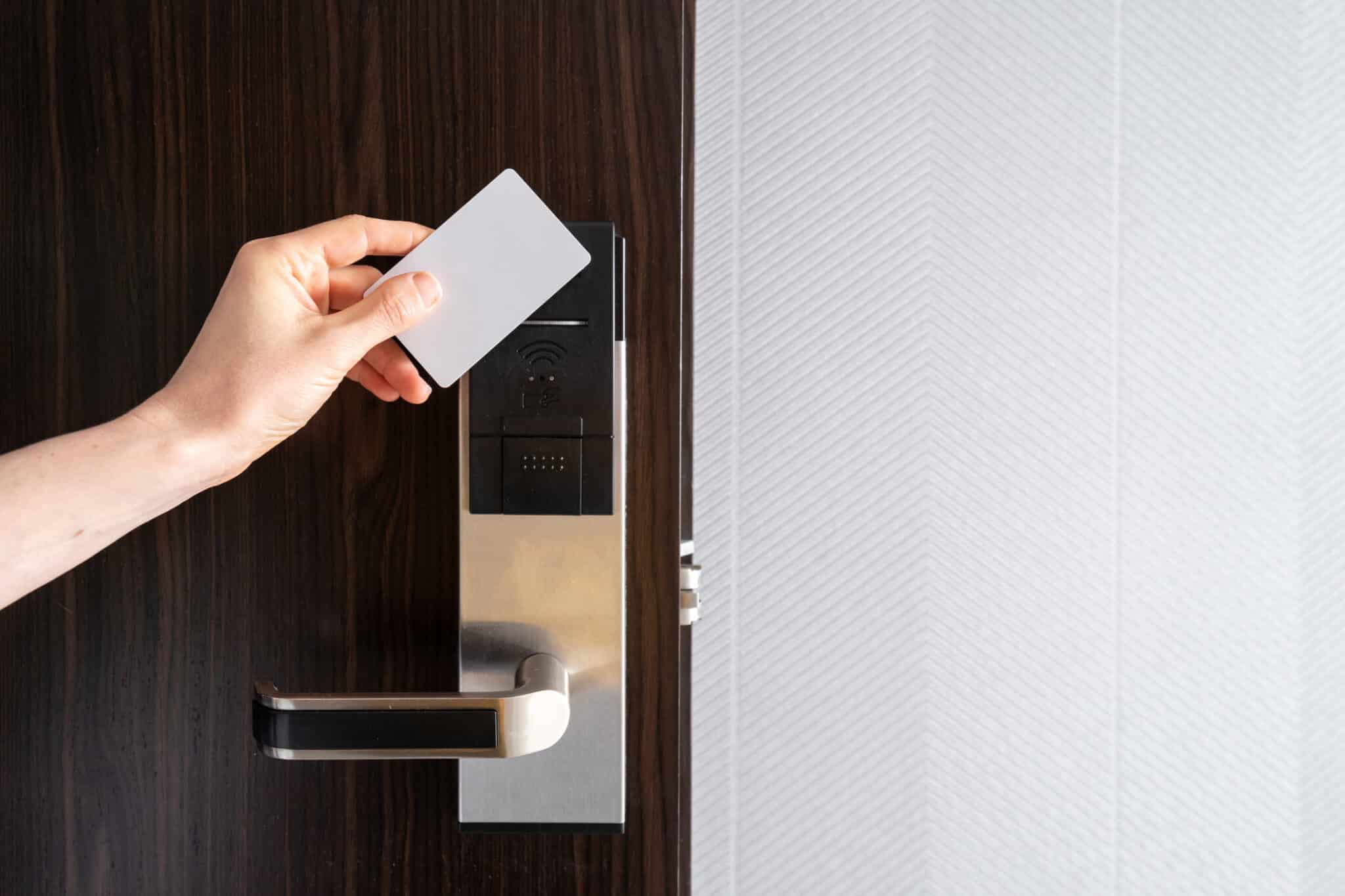In the quest for enhanced home security and convenience, homeowners are increasingly faced with a choice between smart doors and traditional locks. This decision is particularly relevant for residents in areas like Denver, TX, where the demand for innovative home solutions is on the rise. Smart doors, with their advanced features and connectivity, offer a modern twist on home access, but how do they stack up against the time-tested reliability of traditional locks? It’s a question worth exploring for anyone considering an upgrade to their home security system.
Smart doors bring the future to your doorstep, allowing for keyless entry, remote access, and a plethora of customizable security features. Imagine being in Castle Rock, CO, and unlocking your door in Denver, TX, for a friend with just a tap on your smartphone. This level of convenience and control is a significant leap from the conventional lock-and-key mechanism. However, the allure of traditional locks lies in their simplicity and the physical security they offer, which has been trusted for generations.
The debate between smart doors and traditional locks isn’t just about security; it’s also about integrating technology into our daily lives. For some, the idea of their home security being dependent on Wi-Fi or batteries may introduce a level of discomfort or perceived unreliability. On the other hand, proponents of smart doors argue that the benefits of having real-time alerts, access logs, and the ability to integrate with other smart home devices far outweigh any potential downsides.
As we delve deeper into comparing these two options, it’s important to consider not only the immediate benefits but also the long-term reliability and how each choice aligns with your lifestyle. Whether you prioritize the cutting-edge features of smart doors or the straightforward robustness of traditional locks, the goal remains the same: ensuring the safety and convenience of your home. This comparison aims to provide valuable insights to help you make an informed decision that best suits your needs.
Understanding Smart Doors: Technology and Features
Smart doors are revolutionizing home security with their advanced technology and seamless integration into our daily lives. Unlike traditional locks, these innovative systems allow for keyless entry using codes, smartphones, or even facial recognition. The convenience of remotely managing access to your home is unmatched, providing peace of mind whether you’re at work or away on vacation. Additionally, smart doors can send real-time notifications to your phone, alerting you to who is entering or leaving your home.
The technology behind smart doors extends beyond simple entry and exit. Many models come equipped with built-in cameras and intercom systems, enabling homeowners to see and communicate with visitors without opening the door. This feature is especially useful for screening guests or couriers in Castle Rock, CO, ensuring only authorized individuals can access your property. Moreover, the ability to integrate with other smart home devices, like lights and alarms, enhances overall security and convenience.
However, the reliance on technology does raise questions about reliability and security. Smart doors require a stable Wi-Fi connection and sufficient power to operate effectively. In the event of a power outage or network failure, some worry about being locked out or, conversely, leaving their home vulnerable. Manufacturers address these concerns by including backup power options and traditional key access, ensuring homeowners are never left stranded.
In conclusion, smart doors offer a compelling array of features that traditional locks simply cannot match. The ability to control and monitor your home remotely adds a layer of security and convenience that is becoming increasingly important in our connected world. As technology continues to advance, the potential for smart door systems to improve and integrate with our homes seems limitless, promising a future where home security is more reliable, accessible, and user-friendly than ever before.

The Basics of Traditional Locks: Durability and Simplicity
While smart doors bring a high-tech edge to home security, traditional locks stand out for their durability and simplicity. These locks have been the cornerstone of home security for decades, offering a straightforward mechanism that doesn’t rely on electricity or internet connectivity. In places like Castle Rock, CO, where the weather can be unpredictable, the reliability of traditional locks is a significant advantage. They provide a sense of security that remains unaffected by power outages or network issues.
Traditional locks require physical keys, which some view as a benefit for control and privacy. There’s no need to worry about hacking or electronic failures, making them appealing to those cautious of digital vulnerabilities. This simplicity extends to their maintenance as well; traditional locks typically require less upkeep compared to their smart counterparts. Homeowners appreciate the ease with which these locks can be rekeyed or replaced, without the need for technical support.
However, it’s important to recognize the limitations of traditional locks in terms of flexibility and convenience. Unlike smart doors, they cannot offer remote access or the ability to monitor entry and exit in real-time. This means if you’re away from your home, you won’t have the capability to let in guests or service providers without making prior arrangements. The lack of integration with other smart home devices also means missing out on potential enhancements to security and efficiency.
Despite these differences, the choice between smart doors and traditional locks often comes down to personal preference and lifestyle needs. For those prioritizing ease of use and minimal maintenance, traditional locks are a reliable choice. They offer a proven track record of security without the need for technological engagement. Ultimately, whether opting for the innovative features of smart doors or the enduring reliability of traditional locks, homeowners can find peace of mind in knowing their homes are secure.
Installation Process: Smart Doors vs. Traditional Locks
When considering upgrading your home security, the installation process of smart doors versus traditional locks is a critical factor. Smart doors require a more complex setup, involving electrical components and connectivity to your home’s Wi-Fi network. This might necessitate professional installation, ensuring everything functions seamlessly from the start. In contrast, installing traditional locks is straightforward, often a do-it-yourself task for those comfortable with basic tools.
Transitioning to smart doors introduces homeowners to a world of convenience, but it’s essential to have a stable internet connection and possibly additional hardware. For instance, some systems may need a hub that connects to your router, enabling your smart door to communicate with your smartphone app. This contrasts with the simplicity of traditional locks, where the only requirement is a fitting lock mechanism in your door. Castle Rock, CO, residents might appreciate the minimal fuss and maintenance of traditional locks, especially in areas where internet connectivity might be less reliable.
On the other hand, the long-term benefits of smart doors can outweigh the initial setup complexities. Once installed, they offer unparalleled control over your home’s security, allowing for adjustments and monitoring from anywhere. This capability is especially appealing for those who travel frequently or want to manage access for visitors without physical key exchanges. It’s a level of flexibility and security that traditional locks simply cannot match.
Ultimately, the choice between smart doors and traditional locks depends on your lifestyle, priorities, and how much you value the convenience of modern technology. While smart doors offer advanced features and remote access, they come with the need for a more involved installation and ongoing connectivity. Traditional locks, in contrast, provide a tried-and-true security solution that’s easy to install and maintain, making them a reliable choice for many homeowners.
Analyzing Home Security: A Comparative Overview
In deciding between smart doors and traditional locks, it’s essential to weigh the broader implications for home security. Smart doors elevate the safety of your residence by offering features like customized access codes and the ability to track who comes and goes. This modern approach contrasts with traditional locks, which rely on physical keys and lack the capability to provide real-time updates or access logs. For those in areas like Castle Rock, CO, where technology seamlessly blends into daily life, smart doors represent a significant step forward in managing home security.
However, the sophistication of smart doors does come with considerations, particularly regarding their operation during power or internet outages. While traditional locks remain functional without any power, smart doors often include backup battery systems and manual key options to ensure homeowners are never locked out. This redundancy addresses concerns about reliability, presenting a solution that merges the convenience of technology with the dependability of traditional security measures. It’s a balance that appeals to residents prioritizing both innovation and reliability in their home security systems.
On the topic of ease of use and maintenance, smart doors offer a distinct advantage through their integration with other smart home devices. This interconnectedness allows for a more streamlined, efficient home management experience, unlike traditional locks which operate independently of other systems. For individuals looking to create a cohesive, responsive living environment, smart doors provide the functionality to control security settings alongside other household devices, enhancing both convenience and peace of mind.
Ultimately, the choice between smart doors and traditional locks hinges on personal preference, lifestyle, and the value placed on connectivity and integrated home systems. Smart doors cater to those seeking a high level of control and customization over their home security, offering advantages in convenience, monitoring, and integration with broader smart home ecosystems. Meanwhile, traditional locks remain a steadfast option for those who prefer simplicity and the tangible security of a physical key. This comparison underscores the importance of considering one’s specific needs and preferences when upgrading home security solutions.
The Convenience of Access: Remote and Automated Options
Exploring the convenience of smart doors reveals a world where access to your home becomes effortlessly manageable, regardless of your location. With these advanced systems, homeowners can unlock or lock their doors remotely, using just their smartphones or other connected devices. This feature proves invaluable for those unexpected moments when you need to grant access to friends or service personnel while you’re away. It eliminates the need for hiding spare keys under the doormat, enhancing both convenience and security.
Smart doors also offer automated options that traditional locks can’t match, such as setting schedules for when doors should lock or unlock. This automation can be particularly useful for families with children who come home from school when parents are still at work. By ensuring the door locks itself at a predetermined time, it provides peace of mind that your home is secure. Additionally, it removes the worry of forgetting to lock the door in the hustle and bustle of daily life.
Integration with smart home ecosystems further extends the functionality of smart doors, allowing for scenarios where your door unlocks as your smart security system disarms. This level of integration creates a seamless living experience, where your home’s security and access controls work in harmony with lighting, climate, and entertainment systems. For residents in Castle Rock, CO, where technology plays a significant role in daily routines, such interconnectedness is a step towards a more efficient and manageable home.
Lastly, the ability to receive notifications and keep logs of who enters and exits adds a layer of security and oversight that traditional locks cannot offer. Homeowners can monitor the comings and goings in real-time, providing a clear record of access. This feature is particularly reassuring when you’re on vacation or at work, ensuring that your home remains a safe and secure sanctuary. Smart doors, with their blend of convenience, automation, and integration, offer a compelling argument for those considering an upgrade from traditional locks.
Long-term Reliability and Maintenance Needs
When considering the long-term reliability of smart doors, it’s essential to understand their maintenance needs. Unlike traditional locks, smart doors rely on technology that may require updates or battery replacements. This aspect might concern homeowners in Denver, TX, who prioritize durability. However, many smart door manufacturers design their products with longevity in mind, ensuring they withstand the test of time.
In Castle Rock, CO, where technology integration into homes is common, residents appreciate the convenience of smart doors. These advanced systems often come with warranties and customer support, offering peace of mind to users. The occasional need for software updates ensures your system stays secure against potential digital threats. It’s a small trade-off for the benefits of remote access and home automation.
Maintenance for traditional locks typically involves physical inspections and possibly rekeying. This process is straightforward but lacks the dynamic security updates smart doors offer. Residents looking for a set-and-forget solution might find traditional locks appealing. However, the inability to integrate with other smart home devices or receive security updates puts them at a disadvantage in terms of long-term reliability.
Ultimately, the choice between smart doors and traditional locks depends on one’s lifestyle and preference for convenience versus simplicity. Smart doors offer a future-proof solution for home security, with features that adapt to your needs. Their maintenance and reliability hinge on technological advancements, providing a robust security option for those willing to embrace innovation.
Cost Comparison: Investing in Smart Doors or Traditional Locks
When considering upgrading your home security, the cost plays a significant role in deciding between smart doors and traditional locks. Smart doors, with their advanced technology, often come with a higher initial price tag. This investment covers not just the hardware but also the convenience of features like remote access and integration with smart home systems. In contrast, traditional locks are less expensive upfront, appealing to homeowners in Castle Rock, CO, who prioritize budget-friendly options.
Over time, the cost difference between smart doors and traditional locks can narrow due to maintenance and potential upgrades. Smart doors may require software updates or battery replacements, which could incur additional expenses. However, these costs are balanced by the enhanced security and convenience smart doors provide. Traditional locks, while having minimal ongoing costs, lack the ability to offer security updates or integration with other smart devices.
It’s also important to consider the potential savings smart doors can offer in the long run. For instance, the ability to monitor and control access remotely can reduce the risk of theft, potentially lowering home insurance premiums. This aspect of smart doors is a compelling consideration for homeowners looking to invest in long-term security solutions. Meanwhile, traditional locks, with their straightforward functionality, do not offer features that could impact insurance costs.
Ultimately, the decision to invest in smart doors or traditional locks depends on individual priorities and how one values the balance between cost and convenience. Homeowners in Denver, TX, who value cutting-edge technology and the peace of mind it brings may find smart doors worth the investment. On the other hand, those who prefer the simplicity and lower initial cost of traditional locks might opt for this time-tested solution, even if it means forgoing advanced features.
Making the Right Choice for Your Home
Deciding between smart doors and traditional locks requires careful consideration of your home’s security needs and lifestyle preferences. Smart doors offer unparalleled convenience and control, allowing homeowners in Castle Rock, CO, to manage access from anywhere. This modern solution suits those who value technology and its integration into daily life. However, it’s important to assess whether the benefits align with your specific security expectations and usage habits.
On the other hand, traditional locks have stood the test of time, offering straightforward, reliable security without the need for technology. They appeal to individuals who prefer simplicity and minimal maintenance. For those less inclined to rely on digital solutions, traditional locks provide a sense of security that’s easy to manage. This option is ideal for homeowners who prioritize durability and ease of use over advanced features.
The choice between smart doors and traditional locks also reflects on your willingness to adapt to new technologies. Smart locks require a level of engagement with technology, from installation to daily use, that some may find daunting. They embody the shift towards a more connected, automated home environment, offering features that traditional locks simply can’t match. This makes them a compelling choice for tech-savvy individuals or those looking to future-proof their homes.
Ultimately, making the right choice for your home security comes down to balancing convenience, reliability, and personal preference. Whether you lean towards the innovative features of smart doors or the classic reliability of traditional locks, the goal is to ensure your home in Denver, TX, remains safe and secure. Consider your lifestyle, the level of technological engagement you’re comfortable with, and how much you value the ability to control and monitor your home remotely when making your decision.

Frequently Asked Questions
What are Smart Doors?
Smart doors are advanced entry systems that enhance home security through innovative technology. They allow homeowners to lock and unlock their doors remotely, using a smartphone or other devices. Unlike traditional locks, smart doors offer features like access logs and entry alerts. This makes them a popular choice for those seeking convenience and improved security.
How do Smart Doors enhance security?
Smart doors boost home security by offering advanced features not found in traditional locks. They allow homeowners to monitor entry and exit in real time. With built-in cameras and alerts, they provide peace of mind. This makes them an ideal choice for those prioritizing safety and convenience.
Can traditional locks be hacked?
Traditional locks rely on physical keys and lack digital components, making them immune to cyber hacking. However, they can still be compromised through lock picking or bumping. In contrast, smart doors face risks from cyber threats but often include encryption and security protocols. Both options have vulnerabilities, yet smart doors offer advanced protection features.
Are Smart Doors easy to install?
Installing smart doors is a straightforward process, often requiring minimal tools and time. Many homeowners can do it themselves, following clear instructions provided by the manufacturer. For those less comfortable with DIY projects, professional installation is a great option. This ensures the smart door functions correctly from the start, offering peace of mind and enhanced security.
What maintenance do traditional locks need?
Traditional locks require regular maintenance to ensure they work smoothly. This includes lubricating the lock mechanism yearly to prevent sticking. Homeowners should also check and tighten any loose screws to keep the lock secure. Additionally, making duplicate keys as backups is wise to avoid being locked out. Keeping these simple steps in mind will help extend the life and reliability of traditional locks.







